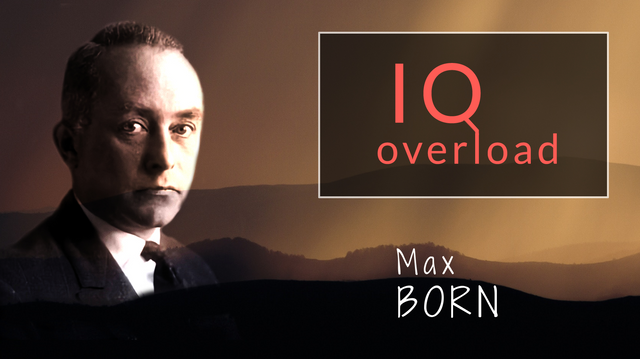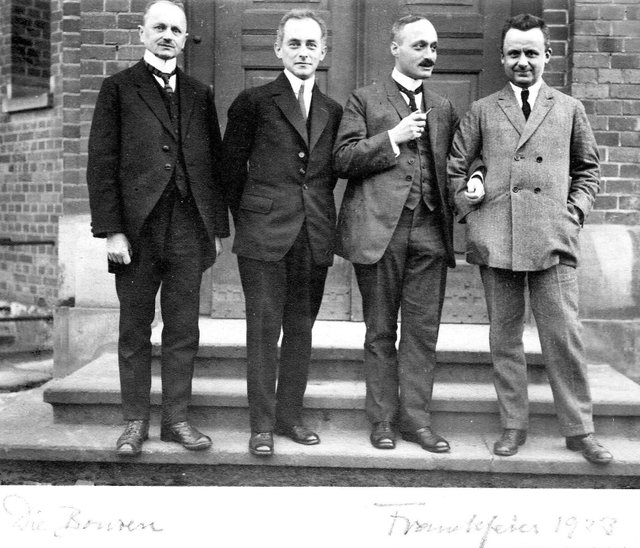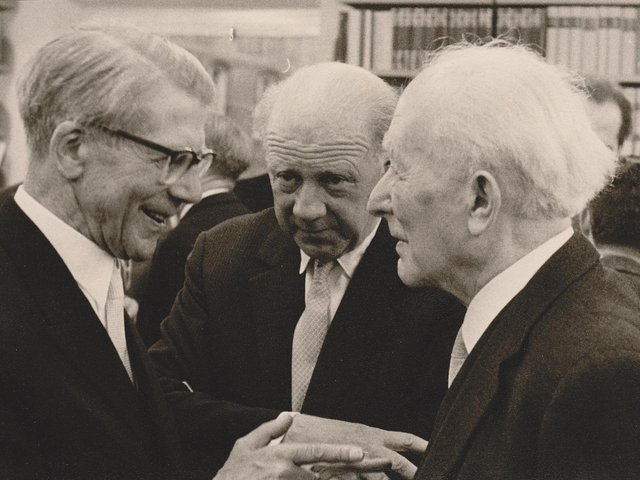#9 IQ overload: Max Born

What can we do to develop our civilization?
based on the life and achievements of Max Born
Max Reich, Max Born, James Franck and Robert Pohl
[image credits: Wikimedia]
Where was Born born?
Max Born, born on the 11th December 1882 in Breslau (at this time in Germany, now in Poland) was the son of anatomist and embryologist Gustav Born and Margarete Kauffmann. He attended König Wilhelm Gymnasium, but before that he had been taught in home, because "he was considered too frail to attend the public school".
After finishing the gymnasium, Max Born started his physics adventure. He studied at universities in Breslau, Heidelberg, Zürich, and Göttingen. Next few years Born spent on research on special relativity, what led him to become an assistant of Hermann Minkowski (if you don't know who's Minkowski, check this).
War changes plans
The first half of XX century was definitely a hard time for all. There were a lot of opportunities that were wasted because of war. Max Born experienced this kind of problem. In 1915 he had accepted the offer to assist Max Planck at the University of Berlin as professor extraordinarius, but the first World War forced him to join the German Armed Forces.
In the army Born was in a scientific section where he was working on the theory of sound ranging. But war and responsibilities in the army didn't stop him to publish his first book, which summarized researches he started in Göttingen: Dynamik der Kristallgitter. It proves that Max Born knew how to organize his time.
Quantum mechanics after the 1st World War
In November 1918 Max Born thanks to Max Planck left the army. In the following year Born finally became a full professor, first at the University of Frankfurt am Main and two years later in a place, which he had already known well - University of Göttingen. Max Born made this university one of the most important in the field of atom research.
Born spent at the University of Göttingen 12 years. During this time he collaborated with many great scientists, but the most important was the cooperation with Werner Heisenberg (also a Nobel Prize winner, I have already written an article about him). The time he was there, as it turned out, was the most efficient in his life.
In 1925 Heisenberg gave Born his first paper on quantum mechanics to review. Max Born quickly realized the importance of this paper. He also noted that the quantities of a particle from this paper can be transcribed and extended to the systematic language of matrices. Soon after that, Born with Werner Heisenberg and Pascual Jordan formulated a quantum mechanics formulation called matrix mechanics.
Matrix mechanics was the first logically consistent formulation of quantum mechanics. It leads to the uncertainty principle and replaced Bohr's model.
Nobel Prize
When matrix mechanics was released, there was no other formulation of quantum mechanics, but a year later Schrödinger made other version based on wave equation. There was one big problem - the interpretation of wave function in Schrödinger's equation. Max Born explained it as a probability density function - the probability amplitude of finding particle to be in the given state in the given time. This explanation is standard interpretation to this day.
It was the reason that Max Born received a Nobel Prize in 1954. However, if you had read some of my previous articles (especially this about Heisenberg) you could realize that Max Born should win the Nobel Prize earlier - though Werner Heisenberg got it in 1932 and he was cooperating with Born. That's true - Heisenberg even wrote a letter to Born, where he admitted that due to "bad conscience" that only he won the Nobel Prize for work they all did together (Born, Heisenberg and Jordan) he couldn't send him a letter earlier. In 1954 Werner Heisenberg wrote an article, where he pinpointed how great their contribution to the final mathematical formulation of matrix mechanics was. This article was for sure one of the reasons that the genius of today's episode finally won a Nobel Prize.
Later life
As I said before, Max Born was at Göttingen until April 1933. He didn't leave this place for his own sake, but he was forced to do so. Forced by Nazi - Jews were dismissed from universities, so Born with his family moved to England, where he stayed until his retirement in 1953. Then he moved to a small town near Göttingen, where he died on 5 January 1970.
I believe that ideas such as absolute certitude, absolute exactness, final truth, etc. are figments of the imagination which should not be admissible in any field of science. On the other hand, any assertion of probability is either right or wrong from the standpoint of the theory on which it is based. This loosening of thinking (Lockerung des Denkens) seems to me to be the greatest blessing which modern science has given to us. For the belief in a single truth and in being the possessor thereof is the root cause of all evil in the world.
Max Born in his Nobel lecture [Wikipedia]
Civilization
It's clear that Max Born and all of the scientists that I have already written about are important bricks in the development of our civilization - you wouldn't even be able to read this post without their discoveries. But achieving as much as them is - let's be clear here - almost impossible. Does it mean that we are useless for civilization? Sure not. So what can we do to be as useful as possible?
You never know. Maybe some of your actions one day will become crucial for the world. Let's consider me as an author of this article. There are chances (always greater than 0) that someone among my readers will become a person like Elon Musk and I will have a little contribution to this. Why did I use this example? I wanted to point out that every action can be beneficial for our civilization, we just have to figure out which ones can be the most influential.
Max Born and his contribution to quantum mechanics are great. It developed our civilization, for sure, but not his whole work was appreciated - for example, Nobel Prize that he won was granted him quite long time after contribution to quantum mechanics. Does that mean that he wasn't useful for civilization for all this time? Sure not. Sometimes your contribution is not being noticed, but it doesn't have to mean that it is useless.
Summary

Friedrich Hund, Werner Heisenberg and Max Born
[image credits: Wikimedia]
In this article, I wrote about a great physicist Max Born and his contribution to our civilization. I explained why and how he got the Nobel Prize. I have also presented how his life looked like and with whom he cooperated to achieve as much as he did. I came to the conclusion that every action can be beneficial for the development of civilization, but we have to figure out how to make them as beneficial as possible.
References:
- more about Max Born:
- more about matrix mechanics:
- more about Born rule:
0. IQ overload: the story of one photo
1. IQ overload: Maria Skłodowska-Curie
2. IQ overload: Niels Bohr
3. IQ overload: Albert Einstein
4. IQ overload: Werner Heisenberg
5. IQ overload: Erwin Schrödinger
6. IQ overload: Max Planck
7. IQ overload: Louis de Broglie
8. IQ overload: Arthur Compton
9. IQ overload: Max Born
Bonus parts:
#2017 IQ overload: Barry Barish, Rainer Weiss and Kip Thorne
Do you like science? Join us on #steemSTEM!

gif made by @foundation